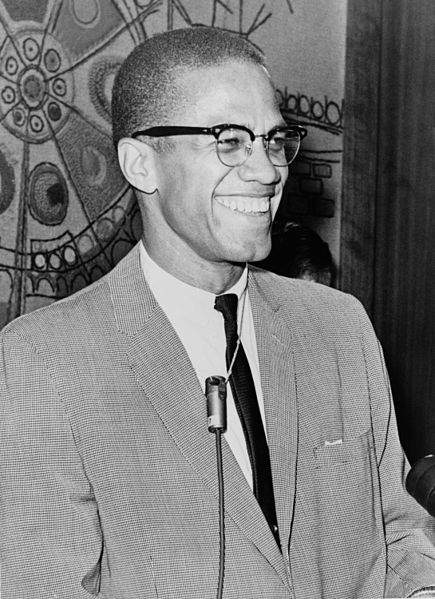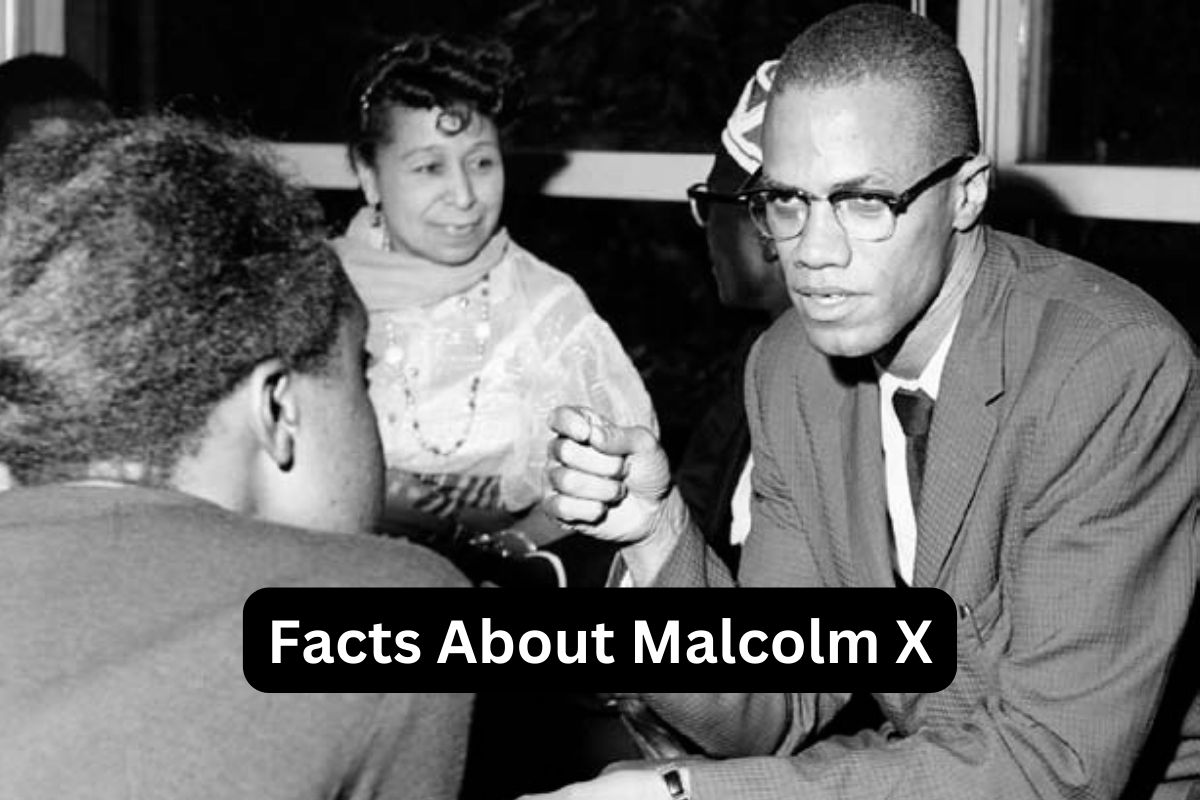Malcolm X, born Malcolm Little on May 19, 1925, in Omaha, Nebraska, was a prominent civil rights activist and spokesperson for the Nation of Islam during the 1950s and 1960s.
His powerful oratory skills, unwavering commitment to black empowerment, and unapologetic advocacy for racial justice made him a controversial yet influential figure.
From his early experiences with racism and his conversion to Islam while in prison to his departure from the Nation of Islam and his transformative pilgrimage to Mecca, Malcolm X’s life and ideology underwent significant changes.
His assassination in 1965 left a void in the civil rights movement, but his legacy as a passionate advocate for self-determination, black pride, and social justice continues to inspire generations.
Malcolm X Facts
1. Born on May 19, 1925, in Omaha, Nebraska
Malcolm X was born on May 19, 1925, in Omaha, Nebraska, in the United States.
His father, Earl Little, was a Baptist preacher who actively supported Marcus Garvey’s Universal Negro Improvement Association (UNIA), an organization that promoted black nationalism and self-reliance. Malcolm X’s early experiences in a racially charged environment would later shape his activism.

2. Birth name was Malcolm Little
His birth name was Malcolm Little. He was the fourth of eight children in his family.
3. Became a prominent civil rights activist
Malcolm X emerged as a prominent civil rights activist during the 1950s and 1960s, advocating for the rights and liberation of African Americans. His experiences with racism and his involvement with the Nation of Islam fueled his commitment to challenging systemic oppression and seeking justice for black people.
Also Read: Malcolm X Accomplishments
As a civil rights activist, Malcolm X played a crucial role in raising awareness about the plight of African Americans and addressing issues such as racial inequality, police brutality, and institutionalized racism.
He used his platform as a spokesperson for the Nation of Islam to deliver powerful speeches and engage in debates that confronted the prevailing narratives of racial inferiority and white supremacy.
4. Spokesperson for the Nation of Islam
Malcolm X became a prominent spokesperson for the Nation of Islam (NOI), an organization founded in the 1930s that combined Islamic teachings with black nationalist ideology.
After his conversion to Islam while serving a prison sentence, Malcolm X joined the Nation of Islam and quickly rose through its ranks due to his remarkable oratory skills and unwavering commitment to the cause.
Also Read: Timeline of Malcolm X
As a spokesperson, Malcolm X traveled extensively, delivering impassioned speeches and advocating for black empowerment, self-reliance, and the separation of black and white communities.
He passionately articulated the grievances and aspirations of African Americans who felt marginalized and oppressed by systemic racism. His powerful and persuasive rhetoric earned him a large following and increased the visibility of the Nation of Islam.
5. Father’s death believed to be a result of white supremacist actions
Malcolm X’s father, Earl Little, experienced significant racial hostility throughout his life, and his death is widely believed to be a result of white supremacist actions.
Earl Little was an outspoken advocate for black rights and a follower of Marcus Garvey’s Universal Negro Improvement Association (UNIA), which promoted black nationalism and self-determination. Due to his activism, Earl and his family faced constant threats and harassment from white supremacist groups.
On September 28, 1931, when Malcolm X was only six years old, tragedy struck the family. Earl Little’s body was found on the streetcar tracks in Lansing, Michigan. Although officially ruled as an accident, the circumstances surrounding his death raised suspicions of foul play.
Many in the black community, including Malcolm X’s family, believed that Earl’s death was a deliberate act of violence orchestrated by white supremacists who wanted to silence his activism and intimidate others fighting for black rights.

6. Converted to Islam while in prison and changed his name to Malcolm X
The surname “Little” was given to him by his parents, Louise and Earl Little. However, as Malcolm X embraced Islam and became involved with the Nation of Islam, he adopted a new name that represented his African heritage and his rejection of the “slave name” imposed upon his ancestors.
He replaced “Little” with the letter “X,” symbolizing the unknown African surname that had been lost due to the legacy of slavery. This name change was a significant step in his personal and ideological transformation, reflecting his journey of self-discovery and his commitment to black identity and empowerment.
7. Rose through the ranks of the Nation of Islam quickly
Malcolm X’s rapid ascent within the Nation of Islam was fueled by his exceptional oratory skills, unwavering commitment, and charisma.
Recognizing his potential, Elijah Muhammad appointed him as the national spokesperson and gave him significant responsibilities within the organization.
Malcolm X’s passionate speeches and ability to articulate the grievances and aspirations of the African American community helped him garner a large following and increased the visibility of the Nation of Islam.
8. Advocated for black self-defense and separation from white society
As the national spokesperson for the Nation of Islam, Malcolm X emphasized the importance of self-reliance, self-discipline, and black unity. He called for economic empowerment through entrepreneurship and encouraged African Americans to support black-owned businesses.
His message resonated with many who sought to break free from the cycle of poverty and dependence, and his powerful speeches inspired individuals to take control of their own destinies.
9. Founded the Organization of Afro-American Unity after leaving the Nation of Islam
In 1964, Malcolm X announced his departure from the Nation of Islam due to growing ideological and personal differences with its leader, Elijah Muhammad.
He had become disillusioned with the leader’s alleged moral indiscretions and his disagreement with the organization’s strict separatist ideology.
After parting ways, Malcolm X founded the Organization of Afro-American Unity (OAAU), a secular group aimed at fostering unity among African Americans and collaborating with other civil rights organizations.
10. Went on a transformative pilgrimage to Mecca
One of the pivotal moments in Malcolm X’s life came during his pilgrimage to Mecca, Saudi Arabia, in 1964. This journey exposed him to the diversity within the global Muslim community and shattered his previously held beliefs about racial divisions.
Witnessing Muslims of different races and ethnicities praying and interacting together challenged his notion of white people as inherently evil or irredeemable.
This experience led Malcolm X to embrace a more inclusive and universal approach to civil rights, focusing on the common struggles and aspirations of all oppressed people, regardless of race or religion.
It marked a significant shift in his ideology, emphasizing the potential for interracial harmony and cooperation in the fight against racism and injustice.
11. Assassinated on February 21, 1965, in New York City
Tragically, on February 21, 1965, Malcolm X was assassinated at the Audubon Ballroom in New York City. During a speaking engagement organized by the OAAU, three members of the Nation of Islam—Thomas Hagan, Norman 3X Butler, and Thomas 15X Johnson—approached the stage and opened fire on Malcolm X.
He was struck multiple times and pronounced dead shortly after arrival at the hospital. The assassination shocked the nation and reverberated throughout the civil rights movement.
It also left a void in the struggle for racial equality, as Malcolm X was widely regarded as a passionate and influential advocate for African American rights.
12. Co-wrote the autobiography “The Autobiography of Malcolm X” with Alex Haley
“The Autobiography of Malcolm X,” co-written by Malcolm X and journalist Alex Haley, remains one of the most significant and influential works in the realm of civil rights literature.
Published posthumously in 1965, the autobiography chronicles Malcolm X’s life journey, from his tumultuous upbringing and criminal activities to his conversion to Islam and his role in the Nation of Islam.
The book provides profound insights into his evolving ideology, personal transformation, and commitment to racial justice. It continues to be celebrated for its honesty, introspection, and the powerful narrative of Malcolm X’s life.
13. Legacy continues to inspire civil rights movements worldwide
Malcolm X’s legacy extends far beyond his untimely death. His ideas and activism continue to inspire and shape civil rights movements and social justice initiatives worldwide.
His emphasis on self-determination, racial pride, and the fight against injustice resonates with individuals and communities striving for equality.
Malcolm X’s influence can be seen in the works of subsequent generations of activists, including the Black Power movement, the Black Lives Matter movement, and the ongoing pursuit of racial equity. His legacy serves as a reminder of the ongoing struggle against systemic racism and the importance of challenging oppressive structures to create a more just and inclusive society.
